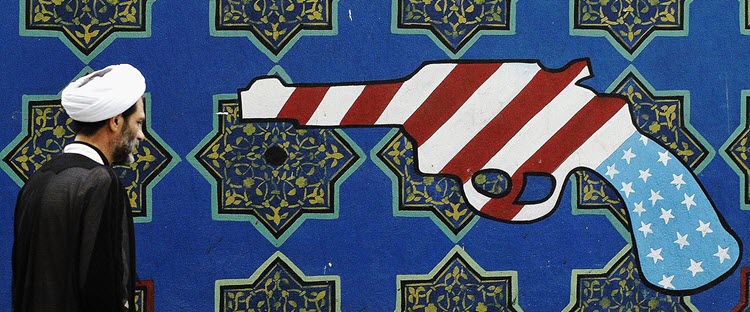
When President Trump named the seven majority Muslim countries named in January’s travel ban, which is now pending a legal review, it caused great concerns for Iranians with connections in the United States. Iran has one of their largest diasporas based in the United States, as well as the largest number of overseas students, and the highest number of people traveling on visitor visas.
These are anxious times for Iranians. BBC Persian received hundreds of messages from worried Iranians, whose lives were thrust into uncertainty once the ban was announced.
The people affected are a diverse group – research students, grandparents on family visits, and LGBT refugees, meaning lesbian, gay, bisexual and transgender people who fled Iran’s regime, and they worry that the story is not yet over. Bardia, a 16-year-old from the persecuted Bahai religious minority writes, “Last year our family applied to migrate to the US. Now there’s a big hold-up in the process.”
It’s not only Iranians with travel plans who are feeling unsettled. Across Iran, people are wondering if the US President will really deliver on his promise to “rip up” the 2015 Iran nuclear deal and “triple-up” sanctions. As well, how will the tough rhetoric between Washington and Tehran impact Iran’s presidential elections this May?
Donald Trump dismissed the Iran nuclear deal as “disastrous”, as far back as when he was on the campaign trail, and Iran experts say comments made by the new Secretary of Defence, James Mattis, are most likely a good indicator of what lies ahead. “I think it is an imperfect arms control agreement,” Mr Mattis told a Senate committee in January. “But when America gives her word, we have to live up to it.”
Former Obama White House Co-ordinator for Arms Control, Gary Samore, says it is possible the Trump administration may push to toughen up the deal, “But they will quickly find out any renegotiation of the agreement will require the US to offer additional sanctions relief.”
The US is not the only signatory to the deal. Walking away from it will risk alienating the European Union, the United Kingdom, France, Germany, China and Russia. This could make it difficult to enforce any new sanctions.
Nader Hashemi, of the Centre for Middle East Studies at the University of Denver, says there are more subtle ways of undermining the agreement, “I suspect Trump will try to strictly enforce the nuclear deal, hoping that Iran will break the agreement and thus be blamed internationally for it.”
Supreme Leader Ayatollah Khamenei and his hardline supporters have been fairly quiet in their response to President Trump. This leads some to suggest that it might actually benefit them to have a confrontational president in the White House. Khamenei is on familiar ground when it comes to responding to tougher rhetoric from Washington. “We appreciate Trump! Because he largely did the job for us in revealing true face of America,” he Tweeted recently.
Mohsen Milani, an Iran specialist at the University of South Florida, says that some hardliners actually see Mr. Trump as a man they could do business with, “They believe he is a practical, non-ideological businessman and a good deal-maker who would be willing to negotiate with Tehran.”
Trump’s ascendancy was less welcome for President Hassan Rouhani, who is standing for re-election in May. The tension between Washington and Tehran may impact his two biggest achievements – securing the nuclear deal, and improving relations with the US. As the election campaign gets under way, Rouhani’s hardline opponents may use the Trump administration’s actions to undermine him.
Trita Parsi, of the National Iranian-American Council says, “If the [travel] ban is a sign of a general line towards Iran with additional measures, then it certainly could affect the elections.” However, the success that the hardliners will have is open to question.
Although the benefits of the end to the sanctions have not yet been widely felt in Iran, the prospect opening up for business has given hope to millions of ordinary voters. They do not want to see these achievements reversed.
Thousands of young Iranians have taken to Twitter using the hashtag #LoveBeyondFlags to reach out to Americans since the travel ban was introduced. It should be noted that the travel ban is unpopular in the United States, as well.
Which makes it ironic that traditional anti-American slogans were on display at the annual rally to commemorate the Revolution in Tehran last week. More heartening were some in English with a different message: “Americans are welcome and invited to Iran”.
There are other upcoming foreign policy concerns that will influence US-Iranian relations. The US and Iran are currently supporting Iraqi forces in the battle to recapture Iraq’s second city of Mosul from so-called Islamic State. Neither side wish to jeopardize this.
President Trump’s pledge to mend fences with Russia may also impact on the US relationship with Iran. “Tehran’s biggest fear is that Trump will seek to move Russia away from Iran in order to open space for Russia-America co-operation in Syria and across the Middle East,” says Alex Vatanka of the East-West Institute.
There are and will continue to be many possible volatile points of tension between Iran and the US. Iranian ballistic missile tests, more unilateral US sanctions, stand-offs between Iranian ships and US Navy in the Gulf, and between US-backed and Iran-backed militia forces in Iraq, are already testing the relationship.
“Over time the [nuclear] deal may unravel because of these,” says Gary Samore. “But I think it’s unlikely either side will immediately abrogate the agreement. The US benefits from the constraint on Iran’s nuclear programme and Iran benefits from the sanctions relief.”







